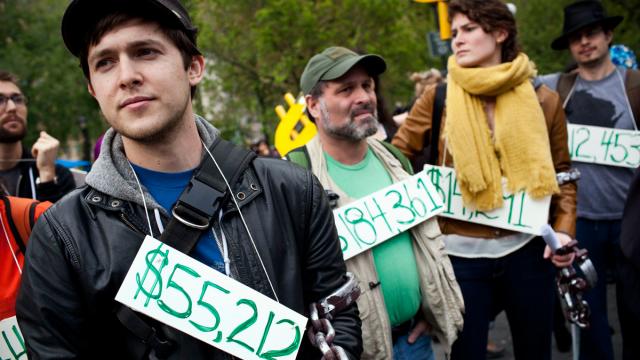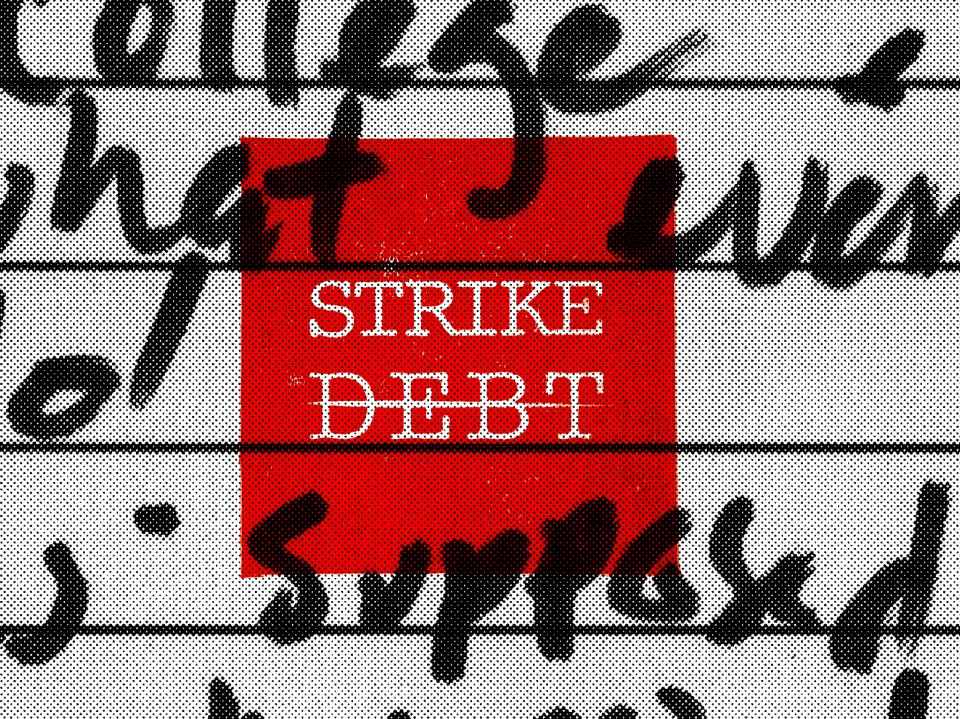
The answer appears so simple that even Saturday Night Live has made a gag of it. To escape the nightmare tide of rising debt, all Americans need do is control their consumption, right? Resist the pull of the flat screen TV, the closet full of brand names, the smart phone. It’s just that easy.
Or is it?
In May 2012, members of the Occupy Wall Street publication Tidal and its working group, Occupy Theory, called for a series of open assemblies to re-evaluate the Occupy movement’s strategies. Conversations quickly coalesced around the topics of education and debt, and the Strike Debt group was born. Taking a cue from the student protests in Quebec, the group began to hold weekly assemblies in Washington Square Park and adopted Quebec’s red square as a symbol of solidarity.
“We realized that student debt, medical debt, housing debt, credit card debt – these are all necessities of life, and people are stuck,” said Susan Meaney, a member of Strike Debt’s organizing committee and a mother of two college-age children with student loans.
With roughly 75 percent of Americans mired in some kind of debt, much of it medical or educational, Meaney said, the blame cannot rest on the debtors. When basic necessities like health care and schooling are partially or entirely debt-financed, consuming less is not the answer.
“It’s a systemic problem,” she said. “It’s not because [Americans] don’t know how to handle their money. There’s a system in place that keeps them that way. We wanted to open up a conversation and let people know that they are not alone.”
One of Strike Debt’s most publicized initiatives is the Rolling Jubilee, a donation-based fund that has already purchased and abolished more than $1 million worth of people's private medical debt in the United States. The initiative has brought attention to the “shadowy, speculative secondary debt market” where defaulted medical and credit card debt can be sold to debt collectors, who purchase it for a fraction of the price and turn a profit by pressuring debtors to pay the full amount. The group's most recent debt buy involved obtaining a portfolio worth over $1 million — for around just $21,000.
“We purchase the debt like a debt buyer, but instead of trying to collect on it we abolish it,” said Ann Larson, Rolling Jubilee’s assistant treasurer. “This is like public education, letting people know that this is happening. These are people who haven’t been able to pay their medical debt, people who got sick [or] had an accident, and now debt buyers and collectors are profiting from it. They are trafficking in misery.”
Another large Strike Debt initiative has been the 130-page Debt Resistors’ Operations Manual, a handbook that outlines various forms of debt and debt resistance. Debt resistance, the manual explains, can consist of anything from intentionally defaulting on debt to simply negotiating with creditors for more equitable interest rates. The publication is available for free online and at Strike Debt rallies. A second edition will be available in mid-September for purchase on Amazon, but will remain free online and at demonstrations.
“The problem is that people suffer from debt alone, often overwhelmed by feelings of shame,” Rolling Jubilee secretary Christopher Casuccio wrote in an e-mail. “With the DROM, we tried to tell a story to other people who feel as isolated as we do, a story about our economic system and the role that debt plays as a predatory tool for capitalists. We have received thousands of emails from debtors all over the country, [which] confirmed what we suspected: debt is a crisis and people are suffering everywhere, often with nowhere to go and nobody to talk to.”
Strike Debt affiliates have popped up around the country, in places like Oakland, San Francisco, Portland, Philadelphia, Detroit, Chicago, and Minneapolis. Many of the groups are still in their infancies, working out an organizational structure and planning initiatives. They are in conversation with the New York hub to varying degrees, but are encouraged to focus on the issues directly affecting their communities.
Strike Debt Bay Area, for example, has formed several subgroups aimed at tackling different facets of the debt problem, and has so far held two Debtors’ Assemblies, a small rally on tax day, and joined in protesting the closure of a post office in Berkeley. The movement is small but optimistic.
“We’re basically trying to establish a critical mass here in the Bay Area,” said Margaret Rossoff, a member of the organizing committee. “We have a few people who are really committed, but we need more.”
However, Strike Debt has also weathered serious upheaval in recent months. On the eve of this year’s May Day demonstrations, Amin Husain, one of Strike Debt’s original members, sent out an e-mail announcing his departure from the group, citing vicious infighting and ideological differences. The move sparked a small exodus of members who shared Husain’s views.
The Palestinian-born artist and activist, a former corporate lawyer, abandoned his profession to take up the mantle of political activism and helped plan the original occupation of Zuccotti Park on September 17, 2011. For some, Husain had become a public face for Strike Debt, and perhaps even for Occupy. His departure was seen as an unsettling comment on the movement’s future.
“I’ve come to think you can’t really build a movement around debt,” Husain said. “When you substitute capitalism with [conversations about] debt, the problem is that you don’t pick up issues like race, racism, white supremacy in society, and patriarchy. That’s not Occupy.”
In his e-mail, Husain cited legal scholar Frances Lee Ansley’s definition of “white supremacy” as a main source of conflict within the group:
“By ‘white supremacy’ […] I refer to a political, economic and cultural system in which whites overwhelmingly control power and material resources, conscious and unconscious ideas of white superiority and entitlement are widespread, and relations of white dominance and non-white subordination are daily reenacted across a broad array of institutions and social settings.”
Husain felt that Strike Debt was reproducing these dynamics, if unconsciously, in a largely homogenous movement. He said that Strike Debt was sidestepping crucial conversations about race, class and gender, and how these are used as instruments of oppression.
“Strike Debt is not addressing race and patriarchy in a way that I think is healthy, and it’s limited by not being multi-racial, multi-ethnic, multi-cultural,” he said. “The main reason I left is because we couldn’t have these conversations. There were a lot of interpersonal dynamics that stopped that from happening. I don’t want to be part of something that is predominantly white that will produce the same world.”Still, Husain has not left Occupy for good but has merely shifted his efforts elsewhere. He has continued his work with Tidal’s editorial team, as well as Occupy Theory, and continues to promote the kind of radical social shift sought by Occupy as a whole.
The remaining members of Strike Debt have acknowledged the upheaval and the issues raised by these departures, but are committed to moving forward with their current structure.
“These sorts of conflicts are inevitable in any social movement,” Larson wrote in an e-mail. “As for the future, we're tackling the same issues and questions that have animated our work since the beginning. My sense is that most active members feel that, while we must always learn from past conflicts, we're headed in the right direction.”
Casuccio added that the group has adopted a set of principles aimed at promoting “direct democracy, autonomy, accountability, and anti-oppression. We're very aware of these challenges and are committed to facing them honestly, actively, and with reflection and humility.”
Recently, Strike Debt members have been supporting Cooper Union students protesting the university’s controversial decision to charge tuition. Members say that upcoming Strike Debt initiatives may be aimed at not only combating student debt but also the shady economic underworld of check cashing and payday lending. They have been quietly gearing up for another debt buy as well as the release of a second edition of the Debt Resistors’ Operations Manual.
“We want to build a national debtors’ movement, and that takes a lot of planning,” Larson said. “It takes a lot of focus, a lot of thinking about the logistics and communicating with people in different parts of the country.”
But already it's clear to many that the conversation to abolish debt is happening among ordinary Americans, from coast to coast — and that it's growing louder.
“Everybody you talk to knows that there’s a problem here,” Meaney said. “This is not what democracy looks like.”
3 WAYS TO SHOW YOUR SUPPORT
- Log in to post comments













